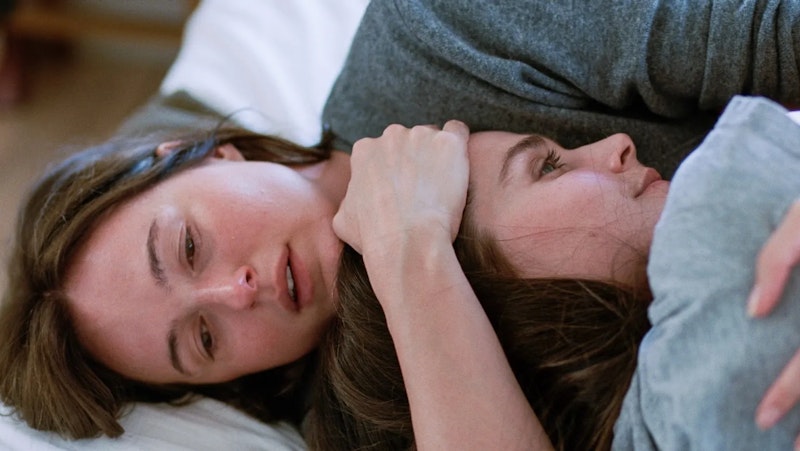Joachim Trier’s first trip to the Criterion Closet, in a video uploaded on April 15, 2016, is a significant text. Trier, boundlessly charming and optimistic, bobs about as he rhapsodizes over Paul Schrader’s Mishima: A Life in Four Chapters (“maybe the most structurally sophisticated film I’ve seen”), Akira Kurosawa’s High and Low (“this is one of those movies that, you often think, ah, I’ve seen them all, and then, there’s this… a movie that feels free to be multiple things”), and of course, Éric Rohmer’s Six Moral Tales (why is everyone obsessed with Claire’s Knee? My Night at Maud’s is the masterpiece). Recorded nearly a decade ago, Trier shows the same undiminished enthusiasm and curiosity for cinema of all kinds, just as his peer Sean Baker exhibited in a video uploaded around the same time, when he said he “considers Lee Chang-Dong a modern master,” and lamented the loss of the recently departed Chantal Akerman (“I hope she knew how much her films meant to the world.”)
These are important documents, proof that these men and most directors who enter the closet know what they’re talking about. I wasn’t impressed with Jason Bateman’s blasé attitude in the closet recently, casually admitting he wasn’t much of a movie buff (which isn’t necessarily bad for a director), while maintaining a smug, incurious attitude toward all the films—like Shampoo—that he hadn’t seen, and probably never would. There are too many directors like Trier and Baker who are better advocates for cinema than they are as directors on their own. Baker has far more verve and edge in his work, but he’s still relatively conservative, clearly a graduate of a certain era of film school. Trier’s films are even more mannered and precise; most of them feel like school projects that won a prize, or at the very least got an “A.” His English language debut Louder Than Bombs, the film he was promoting in that Criterion Closet video, is still his worst work.
But even in the Norwegian films Reprise and Oslo, August 31, reality only goes so far; tragedy’s contained within clear boundaries. The presence of brooding Eskil Vogt lends these films most of their pathos, but even when he finally decides to end his life after a day of rumination in Oslo, August 31, the camera dollying in as he gives himself a hot shot of heroin, it feels like an exercise. It always feels like an exercise with Trier.
That’s why 2021’s The Worst Person in the World was such a surprise. Trier, Vogt, and star Renate Reinsve nailed the melancholy of our moment, a pop culture not just dead but decomposing, producing nothing more than nostalgia tours and retreads from here to eternity. In the film’s most moving scene, a dying Vogt talks to Reinsve about how much his movies, music, and books used to mean to him, and how now he feels almost nothing. Was it all pointless? Still, Trier has Vogt deliver this speech dying of cancer, tragically young, in a move that verges on parody. It’s such a blunt and unnecessary emphasis, undercutting a scene that would’ve worked performed against a brick wall with zero context. In a semi-episodic film, it’s this scene that ensures The Worst Person in the World’s place as some kind of Millennial touchstone, if not classic.
Trier’s follow-up, Sentimental Value, is a bitter disappointment, although not nearly as undistinguished and muddied as Louder Than Bombs. Working with familiar faces Vogt, Reinsve, Inga Ibsdotter Lilleaas, Stellan Skarsgård, and American star Elle Fanning, Trier has given us yet another finely-crafted and keenly-acted drama about adults learning how to live. Reinsve plays an actress, introduced having a panic attack in the wings about to go on stage, the ominous strains of “Dies Irae” booming through the building. Why so nervous? It’s never explained, but the shadow of her filmmaker father (Skarsgård) looms over the film. The problem is that we never really see Skarsgård behaving badly, and the actor is too casually charismatic to ever come off as threatening, at least in this essentially playing himself role, or his familiar movie persona.
He’s making a semi-autobiographical film, and he wants estranged daughter Reinsve to star in it; she won’t do it, so he enlists Rachel Kemp (Fanning), an adoring if slightly dimwitted American actress, eager to dye her hair and learn the accent. Unlike Lilleaas, who starred as a child in one of her father’s films, Reinsve has never worked with her father, but she feels betrayed when he decides to make the film anyway with Kemp. But, sensing that he only ever wanted his daughter in the role, Kemp drops out, and in the end, the family comes together, better for the art they’ve made and the lives they’ll now live.
None of this is exciting, unique, or particularly engaging. There’s crying, screaming, and scheming, but to what end? Skarsgård didn’t abuse his kids, he was merely an absentee dad, a man who struggled to connect with children. The level of anguish here might be realistic, but it’s not enough to power a film about familial resentment, especially when Skarsgård is so effortlessly charming. The film’s prologue, about the life and feelings of a house, and whether or not it feels good when it’s “full,” would’ve made a superior short film. Hey, there’s still time, the movie doesn’t come out until Friday—better yet, just walk out when the title Sentimental Value comes on the screen. Those are your new end credits, Mr. Trier.
—Follow Nicky Otis Smith on Twitter: @NickyOtisSmith

